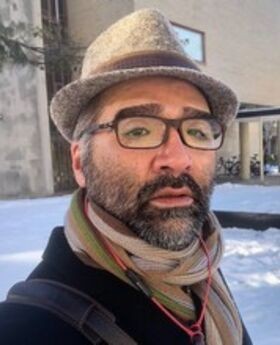
BA, MA University of Texas at Dallas
MA, University of Wisconsin at Madison
PhD, Boston University
Dr. Navid Fozi is an Assistant Professor of Cultural Anthropology who joined the BSU Anthropology Department in August 2018. Fozi teaches courses on the anthropology of law and human rights, religion and spirituality, global migration, myth and culture, the Middle East, theory, and more. His research explores minorities, migration, and emergent forms of pluralism and nationalism in Iran and its diasporas.
Fozi has conducted fieldwork with and published about ethno-religious minorities in Iran. His article on the understudied Ahl-e Haqq (Yarsan) community, “The Hallowed Summoning of Tradition: Body Techniques in Construction of the Sacred Tanbur of Western Iran” (Anthropological Quarterly, 2007), his book on the Zoroastrians, Reclaiming the Faravahar: Zoroastrian Survival in Contemporary Tehran (Leiden University Press, 2014) as well as two recent articles, “The Plight of Zoroastrians in Shi‘i-dominated Iranian Culture: The Socio-Discursive Construct of a Distinctive Community” (ARAM Periodical, 2021) and “Distinction and Survival: Zoroastrians, Religious Nationalism, and Cultural Ownership in Shiʿi Iran” (Iranian Studies, 2022), are part of a body of work that brings scholarly attention to the place and experience of ethnic and religious minorities in Iran. Fozi has also published about contemporary Iranian politics. His articles “Governmentality and Crises of Representation, Knowledge and Power in the Islamic Republic of Iran” (Asian Politics & Policy 2015); and “‘Neo-Iranian Nationalism: Pre-Islamic Grandeur and Shi‘i Eschatology in President Mahmud Ahmadinejad’s Rhetoric,’” (The Middle East Journal, 2016) address the rise of a new work of nationalism and governance in contemporary Iran. Fozi has also conducted fieldwork with and published about the Iranian diaspora in Malaysia, including his recent article “A Fragmented and polarized Diaspora: The Making of an Iranian Pluralist Consciousness in Malaysia” (Diaspora, 2021).
Fozi has been awarded a Visiting Fellowship at Harvard Law School’s Islamic Studies Program (2017-2018), a Fulbright-US Scholarship based at the University of Malaya for fieldwork with the Iranian Diaspora in Kuala Lumpur (2014), a Postdoctoral Research Fellowship at the Middle East Institute of the National University of Singapore (2011-2014), a Visiting Research Fellowship at the Zentrum Moderner Orient in Berlin (2010), a Junior Visiting Fellowship at the Institut fur die Wissenschaften vom Menschen in Vienna (2008-2009), and a Fulbright-Hays Doctoral Dissertation Research Abroad for fieldwork in Iran (2006-2007).
Fozi’s current project is based on 2015-2016 field research among Iranian asylum seekers in Turkey. He undertook this project as a fellow of the Scientific and Technological Research Council of Turkey (TÜBİTAK) at the Middle East Technical University of Ankara. Tentatively entitled Neoliberal Dreams, Human Rights Discourse, and Globalization: The Narrative and Making of Iranian Sexual, Religious, and Political Refugees, this project explores issues that range from the border crossing, transit processes, and right of asylum, to Islamic Shiʿi Jurisprudence, citizenship rights, international politics, and transnational practices.